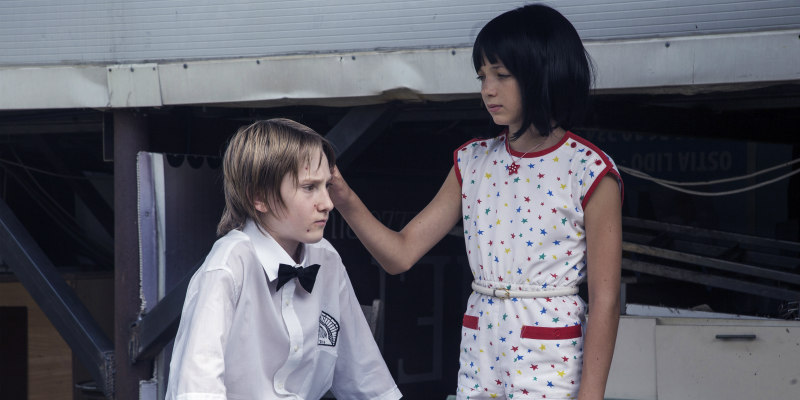
Review by
Eric Hillis
Directed by: Damiano D'Innocenzo, Fabio D'Innocenzo
Starring: Elio Germano, Barbara Chichiarelli, Gabriel Montesi, Max Malatesta, Ileana D'Ambra, Lino Musella

Set in a middle class community in the suburbs of Rome,
Bad Tales revolves around several families, all of whom fall
under the designation of "new money." There's Bruno (Elio Germano),
who pushes his kids so much that he speaks with mild shame of his daughter
for merely getting an A in one subject while hitting straight-As across
the rest of her curriculum. His brother Pietro (Max Malatesta) is a
social climber who refers to his less ambitious sibling as a "scrounging
communist." Residing in a makeshift shack is Amelio (Gabriel Montesi), convinced that some day he'll live in a home behind a picket fence
like his neighbours. Also on the lower rungs of the social ladder is
pregnant teen Vilma (Ileana D’Ambra), who doesn't exactly come
across as a future mother of the year candidate.

A male narrator (Max Tortora) tells us that the events we watch
play out are based on a true story inspired by a lie, but that the lie is
itself rather uninspired. It's left ambiguous as to whether the narrator
is Bruno's shy son Dennis (Tommaso Di Cola) or Geremia (Justin Korovkin), the mentally challenged son of Amelio. The narrator tells us the story
is inspired by a young girl's diary, left suspiciously incomplete,
and again there are several candidates as to which of the film's young
female characters he might be referring to - Viola (Giulia Melillo), the insular daughter of Pitro; Dennis's younger sister Alessia (Giulietta Rebeggiani); or Dennis's prematurely sexualised neighbour Ada (Laura Borgioli).
Over a sweaty summer and into the beginnings of a school year we watch as
the adults of the community tolerate one another in passive aggressive
fashion, throwing parties for guests they would rather not have to
associate with. When Geremia contracts measles, Viola's mother sends her
to spend a day in his presence, hoping the boy will pass the virus onto
her daughter. Geremia's father tells his son where he can find
"protection" should he need it, but such thoughts are the last thing on
the innocent boy's mind. Like measles, adulthood is presented here as a
virus being transmitted from the adults to their children. Though they're
barely pubescent, the kids here are weighed down with unrealistic and
unhealthy expectations regarding school grades and sexual maturity, all by
fathers who regret what they view as their own missed youthful
opportunities, whether that's getting it on with girls or doing well in
school.

The cluelessness of Bad Tales' parents is illustrated in a blackly comic vignette in which Dennis
begins choking on a piece of steak. Apparently unfamiliar with the
Heimlich manoeuvre, Bruno panics, turning his son upside down as though
the offending meat will simply fall out of his throat. Crisis averted,
Bruno explodes in a rage because he can no longer enjoy his steak. In
Bad Tales, those two great pleasures, food and sex, become tainted, leaving little
of life left to enjoy.
Along with the misanthropy of Haneke and Seidl,
Bad Tales owes much to the taboo-baiting black comedy of
Todd Solondz, particularly in the scenarios the D'Innocenzos fashion
around their young protagonists. A failed attempt by Ada to lose her
virginity to Dennis leads to uncomfortable laughs when the latter makes
excuses for his inability to perform - can you imagine what the curtain
twitchers who wanted to ban
Cuties
would make of such a comic scenario?

Climaxing with not one but two disturbing codas,
Bad Tales might easily be accused of simply aiming for cheap
shocks. Yet while misanthropy is often the lazy fallback of superficial
European filmmakers with little to really say, the D'Innocenzos appear to
be commenting on an Italy that's increasingly losing grasp of its joie de
vivre as it attempts to compete with its more stoic Northern
neighbours. They resolve their film with a father and son sitting on a
warm balcony, stuffing mortadella and mozzarella into their faces and
proclaiming "to hell with our enemies." After the stuffy suburban horrors
we've witnessed, it plays as a moment of beautiful honesty.


Bad Tales is on MUBI UK from
February 18th.
